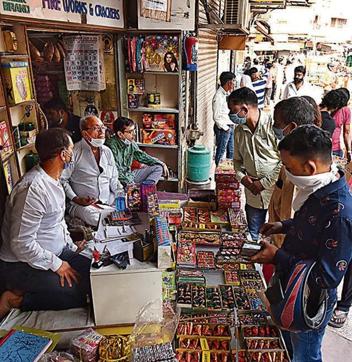Enforcement under new ordinance could be tricky, warn experts
The ordinance says polluters in Delhi-NCR can be fined up to Rs1 crore and/or face imprisonment up to a term of five years for violations.
The process of penalising polluters in Delhi-NCR region under the union government’s Commission for Air Quality Management (CAQM) in National Capital Region and Adjoining Area Ordinance is likely to be a “tricky process”, officials from Delhi’s pollution control board and environment experts said on Friday.

Senior officials of the Delhi Pollution Control Board (DPCC) said since the ordinance says the CAQM “shall prevail in all matters relating air pollution”, there is no clarity if DPCC can continue to levy fines over the set limit of R1 crore -- the maximum amount payable as fine for flouting pollution norms according to the Centre’s ordinance.
DPCC is the capital’s primary air quality monitoring and enforcement body.
The ordinance says polluters in Delhi-NCR can be fined up to Rs1 crore and/or face imprisonment up to a term of five years for violations.
The officials said because of a likely confusion on whether their enforcement teams would be able to issue ‘on-the-spot’ fines or not , there is a possibility of violation of air pollution norms increasing this time.

“We were issuing fines under the Air Act (1981), which does not have any such limit for penalties. However, technically now that the commission has been declared the sole authority for all pollution-related matters in Delhi-NCR, we are not sure to what extent will the state board be able to exercise this power,” another DPCC official said.
Since October 15, when the winter segment of the Graded Response Action Plan (Grap) came into effect, DPCC teams have imposed two fines worth R1 crore on municipal agencies for garbage burning in the open.
Fines ranging between R20 lakh and R50 lakh have also been issued to construction agencies for flouting dust-control norms in the city. Over 40 ready-mix concrete plants and illegally operating industries have been issued fines ranging from R5 lakh to R20 lakh.
According to the new ordinance, if the commission wants to penalise a polluter, they will have to present the case before a first-class magistrate, who will probe the violation and order the penalty if the charge is proven in court. This can make the entire process more time consuming, giving a window to polluters to get away, experts said.
Environment experts said while a fine up to R1 crore and/or imprisonment of up to five years may seem “progressive”, in reality it puts a limit on the fine that can be imposed, which is contrary to the polluter-pay principle.
Environment lawyer Ritwick Dutta said since the commission is an executive body and not a judicial body, it can only issue directions. For instance, if an agency is found to be flouting pollution norms, the new body can direct it to stop operations but it does not have the power to directly fine it.
“They (CAQM) will have to file a complaint case before a magistrate. An investigation will be called to prove the violation. It will be a judicial trial; it will not be an executive order for punishment. They can tell the court that they want to impose a fine but to get it implemented, they will have to prove that the violation was committed and this could take as much time as it does,” Dutta said.

Dutta said the Environment Pollution (Prevention and Control) Authority (Epca) had the same power of imposing fines (earlier up to R1 lakh), but in its 22 years of existence they could not extract a single penalty.
“This route has proved unsuccessful earlier, and we are resorting to same route again,” he said.
Shibani Ghosh, an environmental lawyer and a Centre for Policy Research (CPR) fellow, said the provision for monetary penalties and imprisonment and the process of imposing such a penalty via courts is similar to what is available in the Air Act and the Environment (Protection) Act.
“If you look at National Crime Records Bureau (NCRB) reports, convictions under the Air Act and EP Act are very low. The fear of criminal prosecution is only a deterrent if people notice that polluters are prosecuted and convicted. But it rarely happens. So, in that sense, I don’t see how the provision for criminal penalties in the ordinance could be an effective deterrence,” Ghosh said.
Ghosh, however, said since the ordinance has only just been passed, the nuts and bolts of how things will work out with existing institutions will have to be seen once the commission starts functioning.
A union ministry of environment, forest and climate change spokesperson said the commission will be constituted at the earliest and enforcement under it will be stricter against all kinds of air pollution-related violations. “This special body was formed because the action taken by the earlier teams was lacking in some way. This commission will ensure action is taken,” the official said.
Stay updated with all top Cities including, Bengaluru, Delhi, Mumbai and more across India. Stay informed on the latest happenings in World News along with Delhi Election 2025 and Delhi Election Result 2025 Live, New Delhi Election Result Live, Kalkaji Election Result Live at Hindustan Times.
Stay updated with all top Cities including, Bengaluru, Delhi, Mumbai and more across India. Stay informed on the latest happenings in World News along with Delhi Election 2025 and Delhi Election Result 2025 Live, New Delhi Election Result Live, Kalkaji Election Result Live at Hindustan Times.






